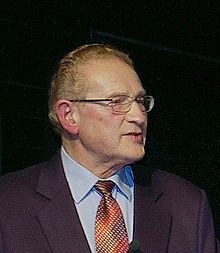Percy Schmeiser facts for kids
Quick facts for kids
Percy Schmeiser
|
|
|---|---|

Percy Schmeiser in Stuttgart (2008);
|
|
| MLA for Watrous | |
| In office 1967–1971 |
|
| Preceded by | Hans Broten |
| Succeeded by | Donald Cody |
| Personal details | |
| Born | January 5, 1931 Bruno, Saskatchewan, Canada |
| Died | October 13, 2020 (aged 89) |
| Political party | Saskatchewan Liberal Party |
| Occupation | Farmer |
| Awards | Right Livelihood Award |
Percy Schmeiser (born January 5, 1931 – died October 13, 2020) was a Canadian farmer and politician. He became well-known around the world for standing up for farmers' rights. He also worked to make sure that transgenic crops, which are plants changed using science, were properly controlled.
Percy's family owned a farm, a gas station, and a place that sold farm equipment. In 1954, he took over these businesses. He later opened another farm equipment store. Percy was a special kind of farmer. He focused on growing and improving plants like canola, field peas, mustard, and wheat. His story was even made into two movies: David Versus Monsanto (2009) and Percy (2020).
Contents
Percy's Legal Battle with Monsanto
In 1997, Percy found some canola plants growing in one of his fields. These plants were growing on their own, without him planting them. He sprayed his field to clear out weeds before planting new crops. To his surprise, some of these canola plants survived the spray. This was unusual because the spray should have killed them. It made him think these plants might be special and resistant to chemicals.
Percy had a long-standing right as a farmer to save seeds from his own crops to plant the next year. So, he saved some of the canola seeds from his fields for planting in 1998. The rest of his canola was sold.
Without Percy's permission, a big company called Monsanto took samples of his canola plants. Monsanto then told Percy he had to pay them a "technology use fee." They said he was using their special patented canola without permission. Percy refused to pay. He said he didn't mean to use their product. He also said the seeds were his because they grew on his land.
Monsanto then sued Percy in August 1998. They said he was using their patented technology without a license.
The Court Case
For several years, Percy's case went through the Canadian court system. Monsanto first wanted money from Percy. But over time, they changed their focus. They said the case was about a bigger idea: proving that their patent was valid. They wanted to show they could sue other farmers who had their patented technology.
Percy became a symbol for people who were against genetically changed crops. He traveled and spoke to many groups around the world. He also faced pressure from a company hired by Monsanto.
Eventually, the highest court in Canada, the Supreme Court of Canada, made a decision. Percy won a big part of the case. The court said he did not have to pay Monsanto any fees or damages. They agreed that Percy did not get any special benefit from Monsanto's technology. However, the court also decided that Monsanto's patent was valid. They said that even if Percy had the patented seeds by accident, he still used their technology.
A movie about Percy's fight with Monsanto, starring Christopher Walken, was released just before Percy passed away in October 2020.
Percy's Lawsuit Against Monsanto
In 1999, Percy filed his own lawsuit against Monsanto. He asked for ten million dollars. He said Monsanto had spread false information about him, trespassed on his land, and contaminated his fields with their special canola. However, this lawsuit did not move forward for many years.
In 2002, Percy's wife, Louise Schmeiser, also sued Monsanto. She wanted money to clean up her organic garden. It had been contaminated with Monsanto's genetically modified canola. But her case was dismissed.
In 2005, Percy found Monsanto's special canola growing in his fields again. He had not planted canola in that field since 1998. He asked Monsanto to remove it. But Monsanto wanted him to sign an agreement saying he wouldn't sue them. Percy refused. He cleaned up the field himself and sent Monsanto a bill for $660. Monsanto refused to pay. Percy then sued them in a small claims court. In 2008, Monsanto agreed to pay the $660 without any conditions.
Percy's Other Contributions
Percy Schmeiser spent over 40 years helping his community and in politics. He was the mayor of Bruno from 1966 to 1983. He also served as a member of the Legislative Assembly of Saskatchewan for the Watrous area from 1967 to 1971. Later, in 2003, he was elected as a town Councillor for Bruno again. He served as the deputy mayor until 2009.
While he was in the provincial legislature, Percy was part of the group that chose the design for the Saskatchewan flag.
Percy also received several awards. In 1984, he got the Merit Award for Dealer of the Year. In 2000, he received the Mahatma Gandhi Award for his work to help society.
Death
Percy Schmeiser passed away on October 13, 2020. He was 89 years old and had Parkinson's disease.
In Film
Percy Schmeiser's story has been featured in several films:
- The Future of Food – 2004
- GMO Monsanto vs Percy Schmeiser – 2005
- Percy Schmeiser : David versus Monsanto – 2009
- Seeds of Death: Unveiling the Lies of GMOs – 2012
- Seeds of Freedom – 2012
- Percy – 2020
 | Delilah Pierce |
 | Gordon Parks |
 | Augusta Savage |
 | Charles Ethan Porter |

